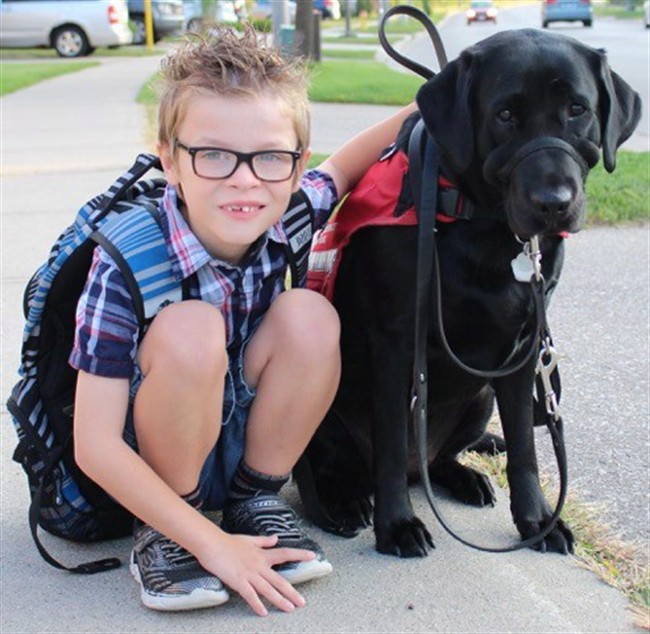An Ontario family has gone to the province’s human rights tribunal to fight for their autistic son’s right to bring his service animal into class.

The family says the Waterloo Catholic District School Board has told them allowing eight-year-old Kenner Fee to bring his black Labrador Ivy into the classroom is not necessary and would place undue hardship on school staff.
Kenner’s father, Craig Fee, says the board has held this position since 2015 and has ignored evidence from his son’s doctors as well as the internationally accredited school that assessed Kenner and matched him with the dog.
Fee says the dog has a significant calming effect on his son, who is prone to high anxiety, frequent meltdowns and even attempts to flee school grounds.
READ MORE: Waterloo school refuses to clarify why boy with autism can’t bring service dog to class
He says having the dog in class would help curb these behaviours, making life easier for Kenner, his classmates and teachers.
The school board did not respond to a request for comment.
Fee said the decision to take the case to the Human Rights Tribunal of Ontario came after nearly three years of struggle with the board where his wife also serves as a trustee.
“I’ve felt like I’m in an alternate universe where what’s up is down and what’s down is up the whole time,” Fee said in an interview Wednesday before the second day of his hearing before the tribunal got underway. “It’s been bizarre.”
READ MORE: Service dog for autistic child not allowed on Vancouver whale watching boats
Kenner was first paired with Ivy at age five after undergoing extensive screening by Lions Foundation of Canada Dog Guides, the Oakville, Ont. organization that trained him.
Fee, initially skeptical of the value a service animal could have, converted quickly after seeing how fast his son could redirect and control his anxiety and antisocial behaviour when with the dog.
Fee said the school board has voiced two arguments to him for keeping Ivy from crossing the classroom threshold.
One centred around the fact that the school door was locked when lessons were in session, thereby making the building private property and giving the board the right to dictate whether the dog was welcome or not, he said.
READ MORE: Mother claims daughter’s service dog was not welcome in Toronto restaurant
The second focused on the fact that Kenner could not fully handle the dog himself due to his lack of fine motor skills, requiring an educational assistant or other staff member to take control of her leash at times, Fee said.
The board’s submissions to the tribunal were not available, but a policy on its website updated in April 2016 outlines its stance on service animals in the classroom.
The policy states that guide dogs for the blind, dogs for the deaf and hard of hearing, and service dogs for a variety of disabilities including autism are all valid accommodations if provided by a certified or accredited training program. But it also creates a distinction between a service animal and a companion or therapy animal based on whether or not the person benefiting from the dog is the one controlling the animal.
“Requests for the use of a Companion Dogs and Service Animals will only be considered as a last resort to accommodate the student’s demonstrated disability related needs,” the policy said
READ MORE: Another Toronto business tells customer with guide dog they aren’t welcome
Such a distinction raises concerns for David Lepofsky, a lawyer and disability rights advocate.
He said the Ontario Human Rights Code, which supersedes even the province’s accessibility legislation, guarantees the right to equal treatment for services including education.
The school board, he said, must prove that accommodating Fee’s request would place undue hardship on the entire school board, not just an individual class or its staff. The board must also prove that it has investigated alternative accommodations, he added.
Lepofsky said distinguishing between service and companion animals shows signs of trying to dodge the issue.
READ MORE: Some Toronto police still unaware of guide dog enforcement despite promise
Fee agrees, saying others stand to benefit from Ivy’s presence in the classroom.
“This is going to make life easier on not only the classroom teacher, the educational assistant, the other student that shares the EA with my son, and all the other kids in that class,” he said. “They’re going to get a lot more learning and work done if my kid’s not shrieking at the top of his lungs or bolting from the schoolyard.”
Fee’s fight is far from unique, according to the Ontario Autism Coalition.
READ MORE: Toronto police admit it’s their job to step in when service dogs denied
Vice-President Laura Kirby-McIntosh said the issue of school board resistance to service animals seems to surface several times a year, adding that rules change depending on individual organizations and schools.
She said the province needs to establish an accessibility standard for education, adding she hopes the outcome of the case before the tribunal may bring some clarity to the issue.
“We can’t have 72 different school boards making 72 different policies on this issue,” she said. “And we shouldn’t see variation from one school to the other in the same school board.”



Comments